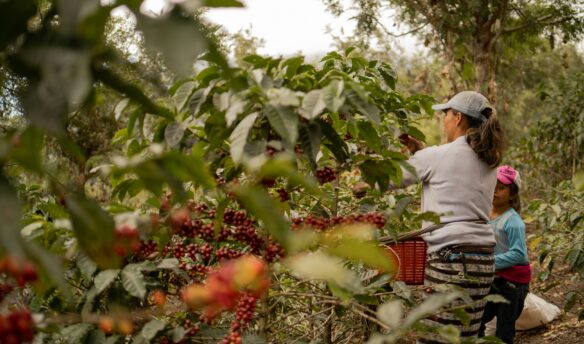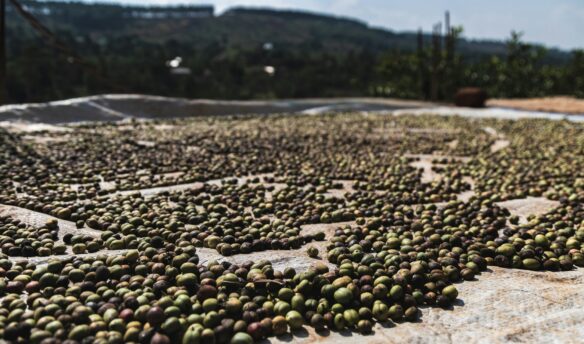Heading out on a CosMc’s run! McDonald’s gears up to challenge Starbucks. Plus, coffee trader Mercon files for bankruptcy, Go Get Em Tiger workers are unionizing, and volcanologists—yes, people who study volcanoes—have some coffee-making tips.
‘Coffee Trader Mercon Runs Out of Credit, Files for Bankruptcy’ – via Reuters
Heavily in debt and facing an “exceptionally challenging operating environment,” one of the world’s biggest green coffee traders, Mercon Coffee Group, has filed for bankruptcy protection in the United States.
The Netherlands-based company listed total debts of $363 million, and in a letter to clients, Mercon said that its lenders had decided not to extend its credit agreements. The company blamed several factors for its financial issues, including logistical difficulties arising from the COVID-19 pandemic, frost and drought in Brazil, and volatile coffee prices. In the letter, Mercon said it would continue to work with clients to “ensure a seamless process concerning open contracts.” A source told Reuters that the company will continue to operate while it is under bankruptcy protection.
According to reporting from Bloomberg, in 2021, Mercon borrowed money to increase its coffee inventories to mitigate the worldwide logistical issues that beset the coffee industry amid the pandemic. “The trader was eventually left with excess supplies of the commodity, which it sold at a loss,” Bloomberg reports. “A surge in interest rates and a subsequent slump in coffee prices further weighed down the company.”
Bloomberg also notes that Mercon’s bankruptcy could cause ripple effects for coffee producers, for whom the company provided financing and currency exchange services. The effects are already being felt in Nicaragua, where the country’s largest exporter—and Mercon subsidiary—CISA Exportadora, unexpectedly shut down a week before news of the bankruptcy broke.
The sudden closure of CISA has thrown Nicaragua’s coffee industry into turmoil, with producers being told not to take their harvest to CISA’s collection centers and amid uncertainty around financing. Mercon, through CISA, ran the microfinancing operation Mercapital, which helped farmers with infrastructure investment to pay the labor and delivery costs of harvesting their coffee. “There is panic among coffee growers,” one producer told Confidencial.
‘Chemists and Volcanologists Want You to Make a Better Espresso’ – via Popular Science
One of the most frustrating parts of coffee brewing is the static-y mess of coffee grounds that stick to the grinder and end up all over the counter. Static electricity also causes clumping and retention of coffee in the grinder. To deal with this, many coffee enthusiasts have embraced the Ross Droplet Technique, a fancy name for adding a tiny droplet of water to beans before grinding to reduce clumping due to static electricity.
Now, a new study from the University of Oregon and Portland State University shows that spritzing your coffee just before grinding not only prevents clumping but can also improve the consistency and flavor of espresso.
“Moisture, whether it’s residual moisture inside the roasted coffee or external moisture added during grinding, is what dictates the amount of charge that is formed during grinding,” says study co-author Christopher Hendon. “Water not only reduces static electricity and therefore reduces mess as you’re grinding, but it can also make a major impact on the intensity of the beverage and, potentially, the ability to access higher concentrations of favorable flavors.”
Published in Matter, the study examined the amount of static electricity produced during grinding coffee from various countries, processing methods, roast levels, and grind settings. Finer-ground and darker-roasted coffee created more static, but adding moisture to the beans before grinding reduced that static and produced more consistent and intense shots.
Interestingly, the researchers found that the static buildup during coffee grinding works similarly to the electrical charge and subsequent lightning in a volcanic eruption (as I’ve always expected). The process of coffee grinding causes static buildup by triboelectrification (surfaces rubbing together) and fractoelectrification (fracturing of particles), which also happens during a volcanic eruption.
“During eruption, magma breaks up into lots of little particles that then come out of the volcano in this big plume, and during that whole process, those particles are rubbing against each other and charging up to the point of producing lightning,” study co-author and volcanologist Joshua Méndez Harper said. “In a simplistic way, it’s similar to grinding coffee, where you’re taking these beans and reducing them to fine powder.”
‘McDonald’s Unveils CosMc’s, Its Answer to Starbucks’ – via CNN
Do you remember the short-lived McDonald’s mascot CosMc? He was an orange alien robot with sneakers who came to McDonaldland on—of all things—a trade mission? Ringing any bells?
No, me either, but this retro creation is the inspiration behind a new McDonald’s offshoot brand—also called CosMc’s—that will focus on the “afternoon beverage pick-me-up” market and take on Starbucks at its own iced coffee game.
“What would happen if a McDonald’s character from the 1980s that was part alien, part surfer, part robot—what would happen if this character were to open a restaurant in 2023?” CEO Chris Kempczinski asked during a recent investor event. It would sell customizable cold coffee drinks like a churro frappe, s’mores cold brew, chai frappe burst, and sweet treats alongside a limited menu of McDonald’s staples. You know, robot alien surfer stuff.
Simply adding these new drink options to current McDonald’s stores would be too complicated, Kempczinski said, so the company is testing the waters with a new format. CosMc’s currently has just one location in Illinois with plans for nine more in Texas next year.
With Starbucks and Dunkin’ dominating the cold drinks segment, it will be interesting to see how CosMc’s does. “This is a $100 billion category that’s growing faster than the rest of (casual dining) and with superior margins,” Kempczinski said. “And it’s a space that we believe we have the right to win.”
More News
‘Starbucks Loses $11 Billion in Value Amid Boycotts‘ – via Newsweek
‘Cup of Excellence Launching’ Origin Immersion’ Program in El Salvador’ – via Daily Coffee News
‘Coffee Lovers to Endure More Pain as Vietnam’s Crop to Fall‘ – via Bloomberg
‘Specialty Coffee Market Set to Double to $51.4 Billion by 2030‘ – via STiR Coffee and Tea
‘Emma Chamberlain High-Key Regrets Starting Her Coffee Company‘ – via Sprudge
‘ICO and SCA Sign MoU in Support of Global Coffee Industry’ – via Daily Coffee News
‘Yellowstone Creator Taylor Sheridan Sues Star Cole Hauser’s Coffee Company’ – via People
‘Major ICO Green Coffee Report Notes’ Growing Americas’ and ‘Shrinking Rest of the World” – via Daily Coffee News
‘The 2023 Sprudge Design Awards Winners’ – via Sprudge
‘Sucafina Subsidiary Beyers Koffie Building All-Electric Industrial Roastery‘ – via Daily Coffee News
The Week in Coffee Unionizing
Workers at Go Get Em Tiger in Los Angeles are unionizing. Over 70% of the company’s 100-plus workforce have signed union authorization cards, and organizers have now filed for an election with the National Labor Relations Board to join IBEW Local 45.
According to a press release, the GGET union is seeking a more equitable workplace, including consistent schedules and pay structures, as well as solutions to “issues of racism, homophobia, and transphobia,” which are “swept under the rug.” Organizers approached GGET ownership and asked for voluntary recognition—the press release states the company then hired “anti-union legal specialists” and sent a letter to workers acknowledging the filing but omitting mention of voluntary recognition.
“Converting GGET to a union workplace would represent a radical change to how we do things,” the letter, signed by co-founder and CEO Kyle Glanville and COO Elena Ceridono, read. “For one, we would not be able to work directly with the coffeehouse teams to continue making the kind of progress we have of late. It’s hard to see that as a positive thing.”
Although IBEW Local 45 primarily represents broadcast, television, and recording engineers on the West Coast, the International Brotherhood of Electrical Workers has worked with employees at Intelligentsia Coffee in Chicago and Colectivo Coffee in Wisconsin. If successful, GGET would be the largest fully unionized coffee chain in California, according to the press release.
“Go Get Em Tiger will always be a union company with or without executive leadership’s cooperation,” the press release continues. “We will reaffirm our choice with a vote if we must, but we’d prefer to begin bargaining and strengthen our workplace now. The CEO and COO say they want to hear the workers’ voices. This is how we choose to be heard.”
The Week in Corporate Coffeewashing
Nestlé, the world’s largest coffee company, will switch “the equivalent of half its global shipping needs to alternative, lower-emission fuels with immediate effect.”
The Swiss conglomerate has signed agreements with its shipping partners Hapag-Lloyd, Maersk and CMA CGM to move to cargo ships that use biofuels, thus “reduc[ing] its annual greenhouse gas emissions from shipping by around 200 000 metric tons of CO2 equivalent,” according to a press release.
The company acknowledges that, because biofuels still cause some emissions, switching is a stopgap solution in its bid to reach net zero emissions by 2050. “The agreements we’ve signed with our shipping partners will help us cut emissions and immediately reduce our carbon footprint,” said Stephanie Hart, Executive Vice President and Head of Operations at Nestlé. “We know this is an interim solution and continue to encourage the development of longer term decarbonization solutions in shipping and distribution.”
Nestlé says the biofuel used for shipping its coffee is “made from waste, such as used cooking oil,” but doesn’t give any more detail. However, it says using such fuel “offer[s] a reduction of at least 70% in equivalent emissions compared with standard options.”
Using waste-based biofuels as a potential replacement for the current, extremely polluting heavy fuel oil has become one of the shipping industry’s major solutions to tackle its contribution to climate change. Cargo shipping is responsible for more carbon emissions each year than the amount of emissions produced by the entire country of Germany, in addition to all the other associated pollutants like wastewater and oil spills. Because the vast majority of green coffee is transported by sea, this is also an issue for coffee companies.
However, the amount of biofuels needed to power all these ships is enormous, and as Grist reported in 2021, there just isn’t enough to go around. Plus, many biofuels are made from corn or other crops, and growing enough to supply the demand for alternatives to fossil fuels can lead to competition with food crops and harmful land use changes, such as clearcutting forests to grow soy.
Beyond the Headlines
‘The Gen Z Mindset Is Changing Coffee’ by Jeff Fromm
‘Around the World, Coffee and Wildlife are Connected’ by Leah Bowman















